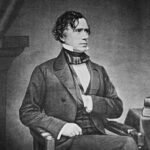President Franklin Pierce’s administration pursued an aggressive foreign policy toward Cuba. The Pierce Cuban annexation efforts represented a controversial chapter in American expansionism. Pierce believed acquiring Cuba would strengthen America’s strategic position in the Caribbean.
The Ostend Manifesto Decision
In 1854, Pierce authorized three American diplomats to negotiate Cuba’s purchase from Spain. James Buchanan, John Mason, and Pierre Soulé met in Ostend, Belgium, to draft their strategy. The resulting Ostend Manifesto declared America’s right to seize Cuba by force if Spain refused to sell. 💰 The document promised Spain $120 million for the island territory.
Why Pierce Supported Cuban Acquisition
Pierce viewed Cuba as essential for American commercial interests in the Caribbean. The president believed Spanish control threatened American shipping routes. Southern Democrats pressured Pierce to expand slave territory through Cuban annexation. ⚠️ Pierce’s advisors argued that Cuba’s sugar plantations would boost the American economy significantly.
The Secret Diplomatic Mission
The Pierce administration conducted these negotiations in secret initially. American diplomats met European officials away from public scrutiny. 📊 Intelligence reports suggested Spain might consider selling Cuba under financial pressure. However, the manifesto’s threatening language soon became public knowledge.
Impact:
The Pierce Cuban annexation attempt created lasting damage to American diplomacy and domestic unity. When the Ostend Manifesto became public, it triggered a massive political firestorm across the nation.
Northern Opposition and Anti-Slavery Backlash
🔥 Northern states erupted in anger over the transparent attempt to expand slavery. Republican politicians condemned Pierce’s Cuban policy as a Southern conspiracy. Anti-slavery newspapers published scathing editorials about the administration’s motives. The controversy strengthened the newly formed Republican Party’s opposition to slavery expansion.
International Diplomatic Consequences
🌍 European nations condemned America’s threatening diplomatic approach toward Spain. Britain and France officially protested the Ostend Manifesto’s aggressive language. Spain immediately rejected any possibility of selling Cuba to the United States. The incident damaged American credibility in international negotiations for years.
Political Fallout for Pierce
📉 Pierce’s approval ratings plummeted following the Cuban annexation controversy. Democratic Party leaders distanced themselves from the president’s foreign policy decisions. The scandal contributed to Pierce’s failure to secure renomination in 1856. Southern Democrats felt betrayed when Pierce eventually abandoned the Cuban acquisition efforts.
Long-term Impact on American Expansionism
The failed Cuban mission marked the end of aggressive territorial expansion before the Civil War. Future administrations avoided similar controversial annexation attempts in the Caribbean region. The controversy deepened sectional tensions that eventually led to national division.
